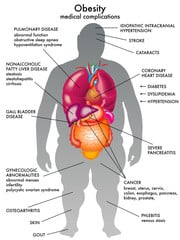Nutrition Goals when Living with Cancer
There are three main nutritional goals for someone living with cancer.
They are:
1) To maintain a healthy bodyweight
2) To select a nutritional plan that will supply the body with fuel and nutrients for repair and healing and aid in the body’s ability to eliminate toxins
3) To prevent recurrence of the cancer and the development of the second malignancy
While it may be overwhelming to administer radical alterations in food choices, it’s got to be understood that if one refuses to make substantive modifications in their lifestyle, everything will stay the same; hence, one’s cancer risk and the potential for recurrence will remain unaltered.
According to the World Health Organization (WHO), overweight and obesity are defined as abnormal or excessive fat accumulation that presents a risk to health. A crude population measure of obesity is the body mass index (BMI), a person’s weight (in kilograms) divided by the square of his or her height (in meters). A person with a BMI of 30 or more is generally considered obese. A person with a BMI equal to or more than 25 is considered overweight. Within the overweight population, 600 million adults and 150 million children have body mass index numbers above 30. In the UK, being overweight/obese is the biggest cause of cancer after smoking, according to Cancer Research UK. According to the Centers for Disease Control (CDC), overweight/obesity account for 40% of all cancers in the United States. 
Researchers predict that at the current rise in the incidence of obesity, cancer rates may escalate by 50 percent by the year 2020. The premise is that being significantly overweight and inactive produces dramatic hormonal and metabolic changes that create the optimum environment for the onset and proliferation of cancer cells. Simply put, the secret to effective and sustained weight control is a five-part process.
- Move toward a plant-based diet – consuming mineral rich foods fulfill the body’s need for nutrients and provides lower calorie and higher fiber foods that usually reduce unhealthy cravings.
- Watch your portion sizes – condition yourself to eat only when you’re hungry and only as much as your body requires. Pausing after each forkful to take a couple of deep breaths will enhance portion consciousness.
- Keep physically active – exercise burns calories, regulates metabolism, relieves stress and may reduce the urge to eat.
- Go slowly – crash diets, skipping meals and excessive exercise are usually short-lived and fail 97 percent of the time. A carefully planned program of a gradual weight reduction, focusing on healthy eating and exercising will provide sustained results.
- Learn to control our response to life’s stresses – this may play a major role in weight maintenance and uncontrolled cravings and binging. It is the regrets of the past and the fears of the future that proliferate much of our unresolved stress. Learning to live in the present can often have a dramatic effect on our ability to reduce stress in our lives.
Achieving and maintaining a healthy body weight is an essential component of cancer prevention and treatment. Gradually reducing body fat and keeping it off is a strong step in the direction to help protect against cancer and assist in its treatment. Although every cancer patient requires an individual nutritional and therapeutic protocol, there are some important general guidelines which may give the body the best chance of preventing or recovering from cancer or other debilitating degenerative diseases.
Dietary supplements are secondary to a sound diet plan because we can’t guarantee that even the best diet offers the optimum nutrients our bodies need. Depleted soils, environmental toxins, impure water, physical demands and psychological stresses heighten our nutritional requirements.
The following few supplements are some of the key recommendations which may significantly reduce the risk of cancer:
- A food-based, multiple vitamin and mineral, especially one that offers adequate levels of anti-oxidants, serves as insurance against major nutrient deficiencies. Being food-based, they generally include important phytonutrients and detoxifying enzymes. Additionally, having a natural food base enhances its absorbability.
- Green drinks are made by drying the juice from one or more of several plants. As these plants are typically 90% water, the usual serving (1/2 ounce or 20 capsules) of the green powder roughly equals one serving of a green vegetable. An extra serving of green vegetable each day doesn’t sound like much, but on average, we Americans eat only two servings per day. As mentioned above, according to the National Cancer Institute, even a small increase in vegetable intake would reduce the risk of ovarian cancer, for instance, by about 20%. Chlorophyll is the substance all green drinks have in common. Chlorophyll structure is almost identical to hemoglobin, except chlorophyll has a magnesium atom where hemoglobin has an iron atom. Our bodies require magnesium to utilize the energy we obtain from our food, and chlorophyll from plants is an important dietary source of this essential mineral. The plants most often used to make green drinks are two single-cell organisms, chlorella and spirulina, and the young leaves of alfalfa, barley or wheat. Besides being rich sources of magnesium, these plants supply reasonable amounts of protein, vitamin E, and essential fatty acids such as gamma linolenic acid, an essential fatty acid that is hard to obtain in the typical American diet. Just as it is prudent to consume a varied diet, it is sensible to use a mixture of the dried greens. A wide variety of other foods are often mixed in with several of green foods, which is okay if the greens are the main ingredient. In addition to known nutrients, chlorella also has something called Chlorella Growth Factor that may aid in human tissue repair. Researchers have also described complex sugars in chlorella that are 100 and 1,000 times more powerful than those currently used clinically for cancer immunotherapy. These complex sugars appear to be cell-to-cell messenger chemicals that stimulate white cells. It is less expensive and tastier, no doubt, to acquire nutrients from whole foods, but if your lifestyle makes it prohibitively difficult to eat as you should, we are fortunate that in America another option exists.
- Probiotics or beneficial bacteria can alter certain enzymes that turn procarcinogens into carcinogenic agents. The “bad” bacteria that secrete these destructive enzymes include clostridium and certain bacteroides, among others. Obviously, the more dangerous enzymes that are present in our gastrointestinal tract, the greater our risk harboring cancer-causing substances. The ability of these active super strains of beneficial bacteria that can neutralize these harmful enzymes is one of the most important contributions to cancer prevention. The immune system’s workload is further complicated by the need to cleanse the body of an increasing number of extraneous pollutants and contaminants found in the environment and the food chain. Overloaded with work, the immune system needs all the help it can get from our friendly bacteria. When disease-causing aliens can permeate the intestinal walls and enter the bloodstream, the immune system must spring into action. If strong colonies of friendly bacteria line the intestinal tract in full force, these harmful microorganisms will not be able to get through, thus lightening the already heavy workload of the immune system. Through scientific research, it has been determined that friendly bacteria can reduce the threat of potential cancer-causing agents in the body and increase the body’s immune system to transform these agents into inactive carcinogens. Some cancer risk factors are under our control, especially diet. Supplementing the diet with probiotics, in addition to healthy dietary choices, is one way to help lower our risk of getting cancer. Additional supplements should be recommended, by your healthcare practitioner, on a case-by-case basis.
The Natural Nutrition Coach Certificate program through our partner, MedeXN Fitness Institute, is designed to teach you the principles of healthy eating and individualized nutrition. Every person’s body is unique. However, the basic principles of eating healthy, whole foods apply to everyone. This course provides a foundation for implementing a natural foods diet as a primary modality in the pursuit of health and the prevention of chronic disease. It is the perfect addition to a Cancer Exercise Specialists business!


